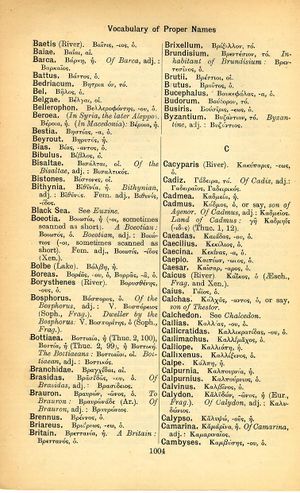Caecina: Difference between revisions
ἀλλ’ οὔτε πολλὰ τραύματ’ ἐν στέρνοις λαβὼν θνῄσκει τις, εἰ μὴ τέρμα συντρέχοι βίου, οὔτ’ ἐν στέγῃ τις ἥμενος παρ’ ἑστίᾳ φεύγει τι μᾶλλον τὸν πεπρωμένον μόρον → But a man will not die, even though he has been wounded repeatedly in the chest, should the appointed end of his life not have caught up with him; nor can one who sits beside his hearth at home escape his destined death any the more
(D_2) |
(Gf-D_2) |
||
| Line 1: | Line 1: | ||
{{WoodhouseENELnames | {{WoodhouseENELnames | ||
|Text=[[File:woodhouse_1004.jpg|thumb|link= | |Text=[[File:woodhouse_1004.jpg|thumb | ||
|link={{filepath:woodhouse_1004.jpg}}]]Κεκίνας, -α, ὁ. | |||
}} | }} | ||
{{Lewis | {{Lewis | ||
| Line 6: | Line 7: | ||
}} | }} | ||
{{Gaffiot | {{Gaffiot | ||
|gf=<b>Cæcīna</b>,⁹ æ, m., nom d’une branche de la [[gens]] [[Licinia]] ; not<sup>t</sup> A. [[Licinius]] Cæcina défendu par Cicéron || <b>-ĭānus</b>, a, um, qui a trait à Cæcina : Capel. 5, 527. | |gf=<b>Cæcīna</b>,⁹ æ, m., nom d’une branche de la [[gens]] [[Licinia]] ; not<sup>t</sup> A. [[Licinius]] Cæcina défendu par Cicéron || <b>-ĭānus</b>, a, um, qui a trait à Cæcina : Capel. 5, 527.||<b>-ĭānus</b>, a, um, qui a trait à Cæcina : Capel. 5, 527. | ||
}} | }} | ||
Revision as of 07:29, 14 August 2017
English > Greek (Woodhouse)
Κεκίνας, -α, ὁ.
Latin > English (Lewis & Short)
Caecīna: (Cēc-), ae, m.,
I a river in Etruria, now the Cecina, Plin. 3, 5, 8, § 50.—
II A town in Etruria, Mel. 2, 4, 9.
Caecīna: (Cēc-), ae, m.,
I a surname in the gens Licinia, originating in Etruria (pure Etrusc. Ceicna, O. Müll. Etrusk. 1, p. 416), among whom the most celebrated is Licinius Cæcina, for whose Roman citizenship Cicero made the oration pro Caecinā, Cic. Fam. 6, 7, 1; 6, 6, 8; Suet. Caes. 75; cf. Sen. Q. N. 2, 39, 1; 2, 49, 1.—Hence, adj.: Caecīnĭānus, a, um: Caeciniana oratio, Mart. Cap. 5, § 527.
Latin > French (Gaffiot 2016)
Cæcīna,⁹ æ, m., nom d’une branche de la gens Licinia ; nott A. Licinius Cæcina défendu par Cicéron || -ĭānus, a, um, qui a trait à Cæcina : Capel. 5, 527.

